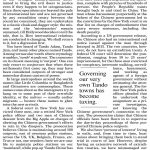
Tando China

WE have all read accounts of, or watched movies about fugitives brought to justice from far-off corners of the world. Historically, these happen to be persons wanted for war crimes, genocide, or both. The protagonists are usually secret agents of the wronged country/nation, determined to bring the evil doers to justice even if they happen to be octogenarians. Since these operations are beyond the pale of international law and are not governed by any extradition treaty between the countries concerned, they are undertaken in a classic cloak-and-dagger style: the mission and the ‘missionaries’ remain unnamed, until Hollywood decides to tell the tale, that is. How international relations are conducted is changing. We shall return to it, but a digression first.
You have heard of Tando Adam, Tando Jam, and many other places named Tando. Among vernacular words where etymology stumbles, ‘tando’ stands out. The consensus on its closest meaning is ‘outpost’. One can only resort to conjecture that when these settlements first came up, they may have been considered outposts of stronger and somewhat distant centers of power.
In large metropolises around the world, names like Little Columbia or Bangladesh and Chinatown are commonplace. These names come about as the immigrants try to hang on to some part of their erstwhile identity, or the natives — usually earlier migrants — bestow these names to ghettoise the new arrivals.
A federal court in New York has convicted three men, one a retired New York police officer and two men of Chinese descent from the Big Apple on charges of abetting the Chinese government’s efforts to rein in the diaspora. The prosecution believes China is maintaining around 100 outposts, sort of